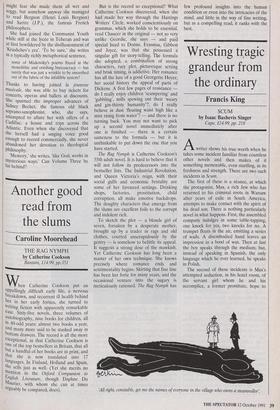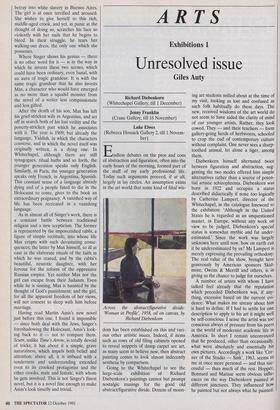Wresting tragic grandeur from the ordinary
Francis King
SCUM by Isaac Bashevis Singer Cape, £14.99, pp. 218 Awriter shows his true worth when he takes some incident familiar from countless other novels and then makes of it something memorable, even startling, in its freshness and strength. There are two such incidents in Scum.
The first of these is a séance, at which the protagonist, Max, a rich Jew who has returned to his criminal roots in Warsaw after years of exile in South America, attempts to make contact with the spirit of his dead son. There is nothing particularly novel in what happens. First, the assembled company indulges in some table-tapping, one knock for yes, two knocks for no. A trumpet floats in the air, emitting a series of wails. A disembodied hand leaves an impression in a bowl of wax. Then at last the boy speaks through the medium; but, instead of speaking in Spanish, the only language which he ever learned, he speaks in Polish.
The second of these incidents is Max's attempted seduction, in his hotel room, of the servant girl whom he and his accomplice, a former prostitute, hope to All right, constable, get me the names of everyone in the village who owns a steamroller. betray into white slavery in Buenos Aires. The girl is at once terrified and aroused. She wishes to give herself to this rich, middle-aged crook, and yet, in panic at the thought of doing so, scratches his face so violently with her nails that he begins to bleed. In their struggle, he tears her walking-out dress, the only one which she possesses.
Where Singer shows his genius — there is no other word for it — is in the way in which he invests these two scenes, which could have been ordinary, even banal, with an aura of tragic grandeur. It is with the same tragic grandeur that he also invests Max, a character who would have emerged as no more than a squalid monster from the novel of a writer less compassionate and less gifted.
After the death of his son, Max has left his grief-stricken wife in Argentina, and set off in search both of his lost virility and the poverty-stricken past which he associates with it. The year is 1909; but already the language, Yiddish, in which the characters converse, and in which the novel itself was originally written, is a dying one. In Whitechapel, although there are still synagogues, ritual baths and so forth, the younger generation speaks only English. Similarly, in Paris, the younger generation speaks only French, in Argentina, Spanish. This constant sense of a language already dying and of a people fated to die in the Holocaust to come, gives to the book an extraordinary poignancy. A vanished way of life has been recreated in a vanishing language.
As in almost all of Singer's work, there is a constant battle between traditional religion and a new scepticism. The former is represented by the impoverished rabbi, a figure of simple rectitude, into whose life Max erupts with such devastating conse- quences; the latter by Max himself, so ill at ease in the elaborate rituals of the faith in which he was reared, and by the rabbi's beautiful, neurotic daughter, with her fervour for the reform of the oppressive Russian empire. Yet neither Max nor the girl can escape from their Judaism. Even while he is sinning, Max is haunted by the thought of God's punishment; and the girl, for all the apparent freedom of her views, will not consent to sleep with him before marriage.
Having read Martin Amis's new novel just before this one, I found it impossible — since both deal with the Jews, Singer's foreshadowing the Holocaust, Amis's look- ing back to it — not to compare them. Scum, unlike Time's Arrow, is totally devoid of tricks; it has about it a simple, grave naturalness, which impels both belief and attention; above all, it is imbued with a tenderness and understanding extended even to its crooked protagonist and the other crooks, male and female, with whom he gets involved. This is not Singer's finest novel, but it is a novel fine enough to make Amis's look tinselly and trivial.



























































 Previous page
Previous page